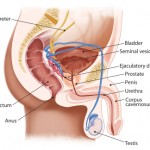What is premature ejaculation?
Premature ejaculation, or PE for short, is defined as the “[p]ersistent or recurrent ejaculation with minimal sexual stimulation that (1) occurs before, upon or shortly after penetration and before the person wishes; (2) is associated with marked distress or interpersonal difficulty; and (3) is not a direct effect of substance abuse…”.1
In 2001, Aschka et al. estimated that up to 60% of men in the U.S. experience premature ejaculation. More conservative estimates put prevalence closer to 27-40% of men.2 Prevalence of PE is higher in men with benign prostatic hyperplasia (BPH) and chronic prostatitis than in men in the general population.
Generally speaking, premature ejaculation is not considered a disease in its own right, but rather a side effect of anxiety, other psychological causes or lack of sexual experience. More and more commonly, practitioners are considering PE to be a neuro-biological condition.
In an effort to take the pressure off, I usually remind the men who come to me for treatment of premature ejaculation that time until orgasm is typically between 3 and 7 minutes according to research done by Corty and Guardiani in 2008. Men who are able to have intercourse for a longer period of time have to teach themselves techniques to restrain their orgasm. Men have to learn orgastic control through trial and error. You’re not born with this ability. Additionally, the first Chinese medicine text to mention PE was published in 610 BCE, so this particular scourge on men has been around for quite some time.
What are the symptoms of premature ejaculation?
Premature ejaculation is characterized by ejaculation that occurs too early — before a man or his partner wants — during a majority of sexual encounters and/or masturbation. PE is uncontrolled and occurs with a very low level of sexual stimulation.
What causes premature ejaculation?
The exact causes of premature ejaculation are not understood. It is probably caused by a combination of physiological and psychological factors, which could include:
- Anxiety, depression, stress, and/or guilt
- Hormone or other chemical imbalances
- Abnormal thyroid function
- Inflammation or infection
- Erectile dysfunction
- Medications
- Genetic factors
- Early sexual encounters that involved the need to rush through intercourse
How is premature ejaculation diagnosed by a physician?
A diagnosis of premature ejaculation can be made by interviewing the patient and/or his partner(s). Other medical tests can be performed to determine the underlying cause of premature ejaculation in a male patient.
These tests include:
- A psychological analysis will reveal if premature ejaculation is psychological/mental in nature or caused by stress, anxiety, or overstimulation
- Blood and urine laboratory tests can detect if premature ejaculation is caused by a hormone imbalance
- Specific tests of thyroid function can determine if premature ejaculation is caused by a thyroid problem
How is PE diagnosed by an acupuncturist?
When I am evaluating premature ejaculation in a patient in the clinic, I rely on the main diagnostic methods of Chinese medicine – looking, listening, palpating. No, that doesn’t require me to see or touch your genitals. I will ask you a lot of questions, look at your tongue, and palpate your pulse and abdomen. These are our traditional diagnostic modalities, created in a time before X-rays and blood tests. The questions an acupuncturist asks help determine your mental/stress state, your general wellbeing, and to better understand exactly how PE is affecting you.
How is premature ejaculation treated medically?
Treatment for premature ejaculation may include one or all of the following:
- Sexual therapy: masturbation, non-penetration forms of sex, the squeeze technique, distraction methods, different sex positions, condom use
- Medications: no drug has been FDA approved to treat premature ejaculation, but antidepressants and anesthetic creams have had shown some success
- Counseling: talk therapy focusing on underlying psychological causes of premature ejaculation
- Mechanical devices such as penile constriction rings
- Relaxation exercises
How is PE treated by acupuncture?
Acupuncturists use what is called pattern diagnosis to explain the various health complaints of our patients. These patterns are usually named after internal organs that we know from biology class, but they don’t necessarily directly correspond to the literal organs in our bodies. By asking a lot of questions during your visit, I will decide what pattern best fits your symptoms. This pattern will then guide the treatments through the selection of acupuncture points and herbal medicines.
In addition to acupuncture and herbal medicine, I often recommend dietary modification, Qigong exercises and self-massage. Of course, you’re welcome to do these massage techniques with your sexual partners, too, as an intimacy building experience.
To make an appointment with me for treatment, please go to the Appointments page. If you have further questions, feel free to ask me through the Contact page.
——
1. Diagnostic and Statistical Manual of Mental Disorders VI
2. International Journal of Impotence Research (2006) 18, S5–S13. doi:10.1038/sj.ijir.3901507

